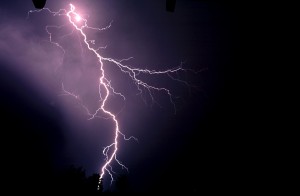Matthew 24:29, 31, Immediately after the tribulation … gather the elect. If no other verse disproves the pre-trib rapture theory, this one does. Here Yeshua clearly states that the gathering of the saints to meet Yeshua as he is coming in the clouds occurs not only after the tribulation, but after the great tribulation (v. 21). The tribulation and great tribulation are separate events from the wrath of Elohim, which John describes as being part of the seven trumpet and seven bowl judgments (Rev 6:17; 11:18; 15:1; 16:1).
Matthew 24:29, 30, Sun will be darkened … sign of the Son of Man. Here Yeshua tells us that certain harbingers of his second coming will occur first. These include phenomenon occurring in the heavens involving the sun, moon and the stars. After this, a miraculous sign in the heavens will occur, and then Yeshua will come. Between the signs of the sun, moon and stars and the final miraculous sign of his coming there’s a gap in time. Yeshua later revealed to John the cosmic disturbances involving the sun, moon and stars would correspond with the sixth seal (as part of the great tribulation that occurs before Elohim pours out his wrath on the earth) of Revelation 6:12–17. After this, Elohim pours out his wrath upon the earth (Rev 6:17; 11:18; 15:1; 16:1), and then the second advent of Yeshua occurs.
Does the sign of the Son of Man coming (Matt 24:30lp) occur before or after the wrath of Elohim? That’s hard to say, but since Yeshua states that between the two events that all men will mourn, perhaps this is a veiled reference to the wrath of Elohim that is to be poured out on unregenerate men during the seven trumpets, seven thunders and seven bowl judgments described in the Book of Revelation. Why else would men be mourning? The intervening time between the cosmic disturbances (the sixth seal of Rev 6:12–17) and Yeshua’s second coming during which Elohim pours out his wrath could be a year or more, since the Scriptures speak of the day (or a period of time) of YHVH’s wrath. The Hebrew word for day (Heb. yom) can mean both a day and a period of time.
The prophet Isaiah speaks in several places about “the day of YHVH’s vengeance” (or words to this effect). This is the time period when YHVH will judge the nations including Babylon the Great, which occurs at Yeshua’s second coming (see Rev 18 and 19). In three places, Isaiah indicates that the day of YHVH will last for one year (Isa 34:8; 61:2 and 63:4). Interestingly, in Isaiah 63:4, the prophet couples the idea of the day of YHVH’s vengeance being a year long with the jubilee year — “the year of my redeemed has come.” This occurs as the Messiah (the subject of Isa 63:1–6) judges the enemies of Israel (notably Edom) as he is at the same time about to redeem (i.e., regather and return scattered Israel to its Promised Land inheritance). It appears that while Yeshua is judging Israel’s enemies at his second coming, he will at the same time be regathering the lost and scattered 12 tribes of Israel. Yeshua seems to allude to this in Matthew 24:31.



I’ve been a “pre-Tribber” but for several years now, I decided it a better plan to prepare for being here through the Tribulation, so that if I WERE still here when it’s “all comin’ down,” I wouldn’t be shocked or offended, nor would my faith be shaken that God hadn’t protected me from the terrible times. This came out of many God-encounters, where He led me THROUGH the trial to great advantage that I would have missed had I escaped the fire! He told me to embrace the pain when it was purposeful, and He would help me assess each scenario. My default system then has changed to “running to the Lord with the pain,” instead of “running to the Lord to escape the pain.” Don’t know if that makes sense!?
So, I am not well versed in the different end-time views, but I am wondering what explanation do the pre-Tribbers give for Matt 24:29-30? And isn’t the Wrath of Elohim just the very final days (times?) of when the world is judged in “that Day — the Day of the Lord?” And is that when we are taken up and behold the final judgment of the nations (Psa 91: we will look on and see the recompense of the wicked.)? Thanks for your brief teaching here — it brought up several questions.